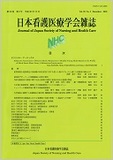Japanese
English
- 有料閲覧
- Abstract 文献概要
- 参考文献 Reference
- サイト内被引用 Cited by
要 旨
【目的】大学病院に就業する看護師長の疲労度・睡眠障害の実態を把握し、疲労度に影響する要因を明らかにする。
【方法】全国の大学病院を対象とし、そのうち研究協力に同意の得られた24の大学病院に就業する看護師長120名に質問紙調査を実施した。
【結果】回収数89名(回収率74.2%)のうち、質問票全てに回答があった女性看護師長71名を分析対象とした。対象となった看護師長は、疲労度が要注意域や危険域にある者が30%を超え、66%の者に睡眠障害があり、疲労度と睡眠障害との関連が認められた。また、睡眠障害、看護スタッフへの疲労教育の実施、休憩時間の短縮、疲労による職務継続不安は疲労度に影響していた。
【考察】今回対象となった看護師長には、疲労度と睡眠障害との関連が認められ、疲労度と睡眠状態の両方を改善する必要性が示唆された。看護スタッフへの疲労教育の実施は疲労度に影響しており、看護師長にとって負担となっていることも推察された。看護スタッフの疲労教育が組織的に行われること、看護師長も疲労・睡眠について学ぶ機会があることは看護師長の疲労軽減・睡眠改善に有効な対策となる可能性が示唆された。
【Purpose】We conducted a questionnaire survey to examine the direction of fatigue education through an analysis of fatigue and sleep disorders among head nurses working in university hospitals.
【Methods】We sent questionnaires to 120 head nurses working in 24 university hospitals.
【Results】71 questionnaires were fully completed and were thereafter analyzed. The data showed that the degree of physical fatigue in over 30 percent of the participants was at the level of “caution needed” or “danger,” and their mental fatigue was alarmingly high. In addition, 66 percent of the participants had a sleep disorder linked to the degree of fatigue they were experiencing.
【Consideration】Which suggests that it is necessary for them to manage their fatigue in order to maintain good health. It was also clarified that sleep disorders, the implementation of fatigue education for other nursing staff, reduced break time, and the anxiety about continuing to work due to fatigue affected the degree of fatigue experienced; therefore, showing that the implementation of fatigue education for nursing staff had imposed a heavy burden on the head nurses. It is suggested that head nurses also need to have an opportunity to learn fatigue education in order to reduce their own fatigue.
Copyright © 2018, Japan Society of Nursing and Health Care All rights reserved.


